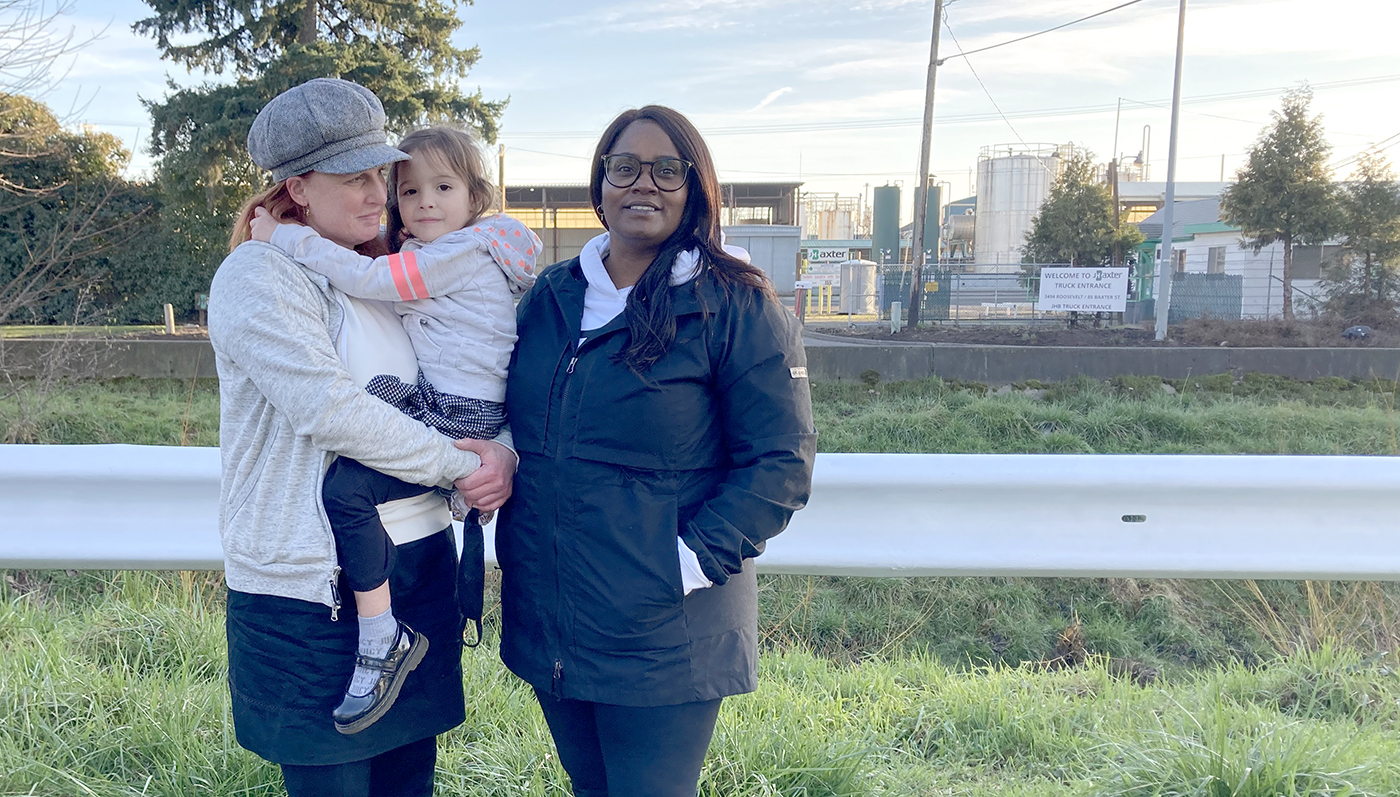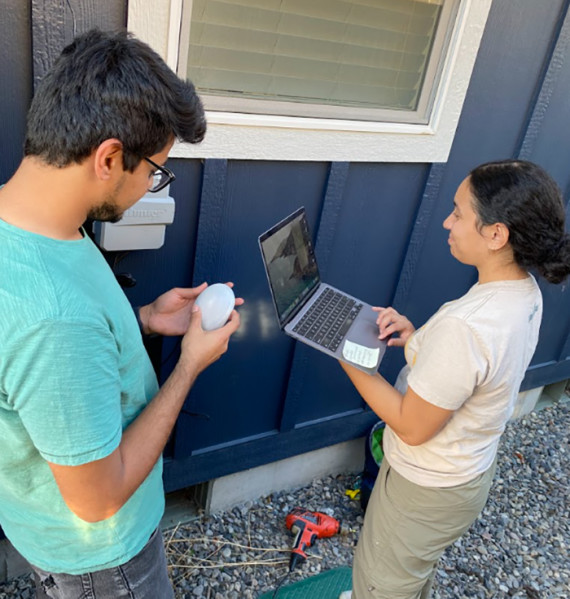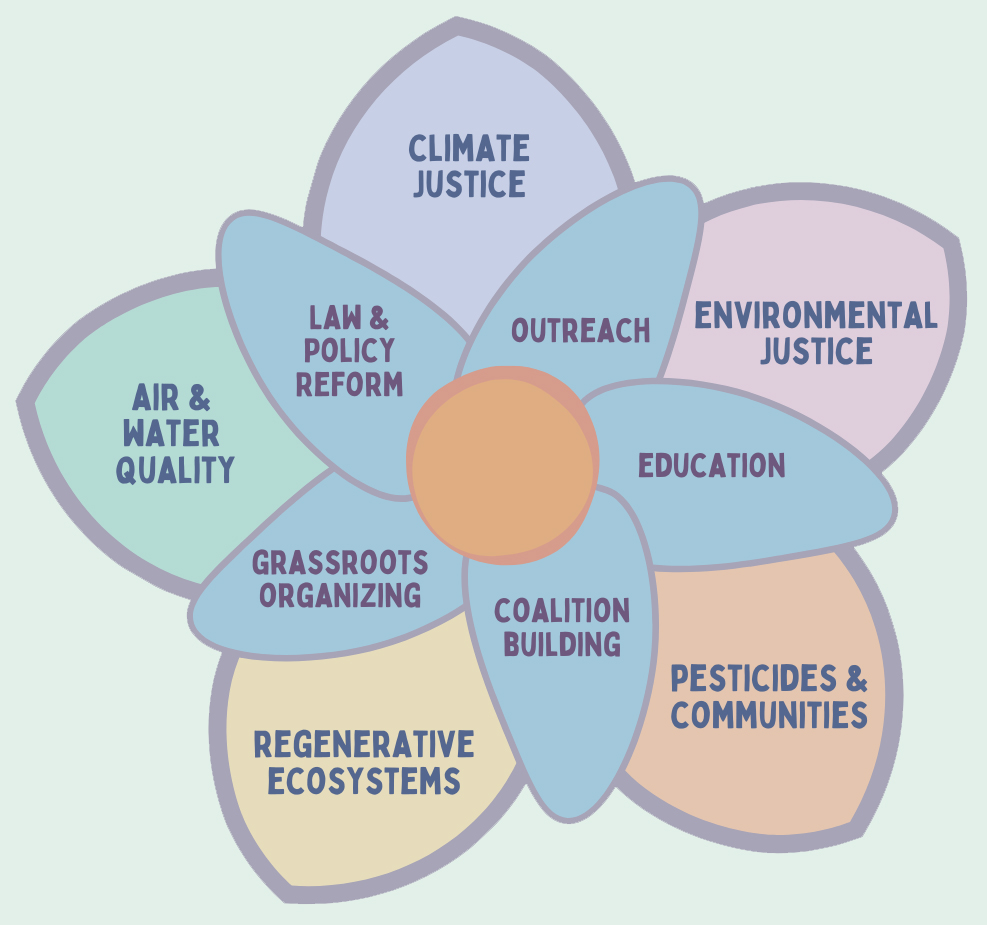About Us
Our Mission
Beyond Toxics provides leadership to build a community-driven environmental justice movement for a thriving and just Oregon.

Arjorie Arberry-Baribeault, West Eugene Community Organizer for Beyond Toxics (R), stands across the street from the now-closed J.H. Baxter factory with her friend Laurie and her daughter Savannah. They are among many West Eugene community clean air advocates who fought for the plant's closure.
The vision we strive for
We envision a society where everyone has equitable access to healthy food and clean air and water, and underserved communities are included in decision making processes that affect them. Together, we move beyond the damaging environmental practices of the past and collectively work to support and maintain ecological resilience and balance.
What we do and who we do it with
Beyond Toxics uplifts voices from Oregon communities disproportionately impacted by pollution and climate change. We are a statewide nonprofit founded in 2001 with offices in Lane and Jackson counties. We collaborate with other nonprofits, educators, and tribal organizations to build a movement to demand that state and local policies require fair, inclusive, and equitable access to clean air, clean water, and safe spaces for all to live and work in. Through grassroots organizing, policy advocacy and education, we support youth and diverse communities become impactful environmental justice leaders across the state of Oregon.

Former BT staffers, Meet Panchal (L) and Paige Hopkins (R) work together to install air monitors in Southern Oregon.
Beyond Toxics Strategic Plan 2024-2026
We are thrilled to debut our Beyond Toxics Strategic Plan 2024-2026 and encourage you to dive deeper into our work from an insider’s perspective. Our Environmental Justice Theory of Change, also known as the Flower Model, is demonstrated in the image on the left and serves as the basis for our plan. The “petals” in the model are a graphic representation of the priority areas we hold as an organization and the dynamic methods we utilize to make an impact.

FLOWER MODEL:
The flower model (above) was inspired by the Climate Adaptation Model adopted by the Confederated Tribes of the Umatilla Indian Reservation Strategic Plan.
Our Approach Methods
Inner Petals
Strategic Priority Areas
Outer Petals
Strategic Plan 2024-2026 Statement
In our Strategic Plan 2024-2026, we hope to capture the essence of our goals in a way that achieves grounding guidance for us as an organization. However, due to the dynamic nature of our work, not all of our ongoing initiatives, programs, and partnerships are able to be highlighted and predicted. With that understanding, Beyond Toxics will always pivot to center environmental justice values within the vital work we do to serve Oregonians.
Resilient Organizational Model
As we engage in ongoing work on a programmatic level, we also understand the importance of strengthening our organization from within. Encompassing internal environmental justice principles is vital to the success of our efforts. We are committed to improving our administrative processes and policies to best facilitate an environment that prioritizes safety, health, and anti-racism. We believe that justice, equity, diversity, and inclusion must be integrated into the fabric of our organization as a whole.
- Meet our Staff and Board of Directors
- Read about how you can Get Involved
- Read about our current projects
- Read about our recent accomplishments
- Read our Non-discrimination policy (below)
- Review our library of Beyond Toxics, reports and newsletters.
- You can help Beyond Toxics provide leadership for a clean and just Oregon by becoming a member and joining our email list!
HISTORY
In the late 1990’s Beyond Toxics’ founders successfully passed the model Community Toxics Right to Know law in the city of Eugene (requires polluters to report their emissions to the Fire Marshall for posting on a public website). Our original founders include Mary O’Brien, Anita Johnson, Michael Carrigan and Steve Johnson. The local fight to pass a Community Toxics Right to Know law inspired Oregon’s environmental leaders to form an organization dedicated to toxics use reduction and environmental justice. Beyond Toxics, originally Oregon Toxics Alliance, was founded in 2000.
BEYOND TOXICS NON-DISCRIMINATION POLICY
This policy states Beyond Toxics’ position on discrimination.
Beyond Toxics values and supports diversity in principle and practice. There shall be no barriers to full and equal participation and/or employment in this organization on the basis of race, creed, color, ethnicity, national origin, religion, sex, sexual orientation, gender expression, age, marital status, physical or mental ability, veteran status, military obligations, national origin or source of legal income.
This policy will be followed by Beyond Toxics’ governing board, staff, volunteers, outside vendors, consultants, and contractors and will be applied to members and those served by the organization.






